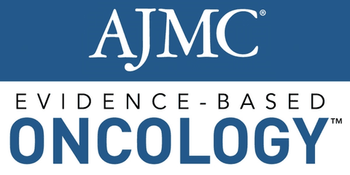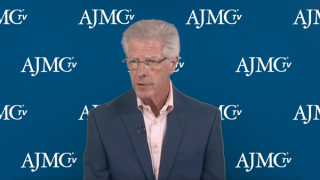
Value-Based Care
Latest News

Latest Videos

CME Content
More News

The editors of The American Journal of Managed Care® and The American Journal of Accountable Care® reflect on the past year and discuss the themes and topics they expect to see in 2022.

Next Gen ACO recently re-branded as the Value Based Care Coalition. To learn more about the organization's new phase, we spoke with executive director Mara McDermott.

Kimberly Westrich, MA, vice president of health services research at the National Pharmaceutical Council, speaks on common misconceptions when designing value-based benefits.

Kimberly Westrich on Incentivizing Value-Based Care in Benefit Design and Reimbursement Strategies
Kimberly Westrich, MA, vice president of health services research at the National Pharmaceutical Council, discusses the shift to a value-based system from a fee-for-service one and how the health care system can incentivize high-value care.

The announcement of a "strategic refresh" for payment models under the Center for Medicare and Medicaid Innovation offered no details on what practices should expect when the Oncology Care Model (OCM) expires in 2022.

Michael E. Chernew, PhD, co-editor-in-chief of The American Journal of Managed Care®, discussed cost and sustainability issues specific to commercial insurance, Medicare, and Medicaid at the National Alliance 2021 Annual Forum held in a hybrid format in Washington, DC.

On this episode of Managed Care Cast, we speak with Abi Sundaramoorthy, MD, MBA, executive vice president of clinical enterprise at Somatus, on fragmented care in chronic kidney disease, its disproportionate impact on minority communities, and the potential of value-based arrangements to address disparities and promote preventive, effective care.

A panel at Asembia 2021 Specialty Pharmacy Summit in Las Vegas addressed challenges in the treatment journey of patients with rare diseases, efforts to improve access to gene therapies, and cost and value considerations for stakeholders.

The state of value-based contracting in specialty pharmacy was addressed in a panel discussion at Asembia 2021 Specialty Pharmacy Summit in Las Vegas, with speakers touching on the essentials of such agreements, how to optimally integrate them, and future considerations for the pharmaceutical marketplace.

Some policy reforms can help incentivize more use of value-based contracts, but overall an area that needs more work is value-based contracts with pharmaceutical companies, said Steven Peskin, MD, executive director, director of population health, Horizon Blue Cross Blue Shield of New Jersey.

Horizon Blue Cross Blue Shield of New Jersey has been involved in a number of value-based cancer care initiatives that will be highlighted during an upcoming Asembia session, said Steven Peskin, MD, MBA, executive director, director of population health, Horizon Blue Cross Blue Shield of New Jersey.

This study demonstrates the need for additional consensus surrounding how to translate guideline recommendations to administrative measures assessing imaging overuse for acute low back pain.

Psychological and emotional needs specific to populations with cancer are often overlooked in clinical research, including those of adolescents, young adults, immigrants, and people of lower socioeconomic status.

An emphasis on transitions of care should ensure the highest level of care for patients and provide support to physicians.

The administration said it would make the results of its drug price negotiations with manufacturers, as well as its approach to value-based care models, open to a variety of payers.

This article provides a description of prospective financial simulation methodology and use cases with empirical data for episode-based bundled payments, including implications for contract negotiations and value-based care redesign.

Multidisciplinary care is an ideal way to management non-alcoholic fatty liver disease (NAFLD) because it is a complex disease associated with numerous comorbidities and necessitating lifestyle changes.

Speakers at the Advanced Topics for Oncology Pharmacy Professionals Summit discussed financial toxicity in health care, how it particularly impacts patients with cancer, and how to address the issue with patients and the health system.

Larger primary care practices in downside risk–only payment models and capitation saw the highest telemedicine utilization rates by their patients enrolled in Medicare Advantage (MA) plans.

The Medicare Access and CHIP Reauthorization Act (MACRA) needs to be reimagined get back on track and to live up to its promise to incentivize value-based care.

At a session of AHIP 2021 Institute and Expo Online, the head of North Carolina's health and human services department and a health equity policy advisor in the Biden administration discussed how collecting and using data to achieve health equity is ultimately a policy decision.

A report from Xcenda showed that biosimilars for 8 blockbuster reference biologics have successfully kept drug prices from increasing by an average of 56%, restoring the possibility that biosimilars could achieve significant discounts despite facing several barriers to uptake.

One-third of health care in the United States is wasted. Despite this recognition, solutions are sparse. The Optimal Care model combines evidence-based medicine, patient-centered technology, and outcomes reporting to transform health care.

The Medicare Payment Advisory Commission (MedPAC) suggested several changes to Medicare Advantage (MA) plan benchmark calculations, with the intent to generate yield savings for Medicare, and urged CMS to streamline alternative payment model (APMs) where it can.

In a 7 to 2 decision, the Supreme Court ruled Thursday that the Affordable Care Act (ACA) will stand, as plaintiffs seeking to declare the law unconstitutional did not have standing.
















